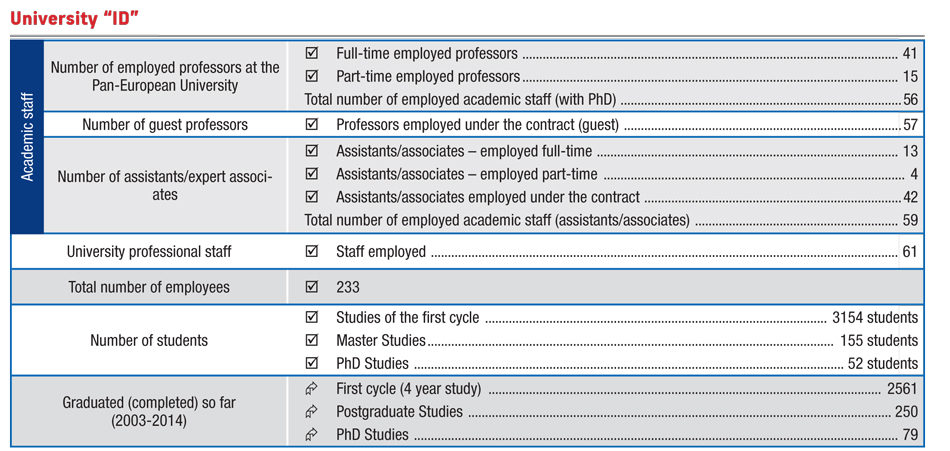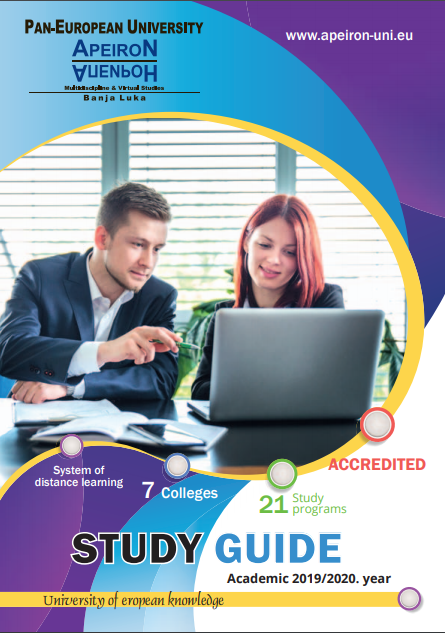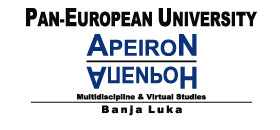
Pan-European University Apeiron
Pan-European University “APEIRON” is the Academic institution of private property, which carries out its activities under the license of the Ministry of Education and Culture of the Republic of Srpska, No. 07.2-4777/07 from 01/08/2007, 07.023/602-3172-5/08 from 28/09/2009, 07.023/612-86-2/10 from 06/09/2010 and 07.023/612-35-2/10 from 06/12/2010, work permit No. 07.2-9624/07 from 28/12/2007 and 07.023/602-6968/09 from 27/11/2009, work permit outside the seat No. 07.023/612-83-3/10 from 17/09/2010 and 07.023/612-35-3/10 from 18.05.2011, license to run distance learning No. 07.2-9624-1/07 from 28/122007, license to run the study programs of the second cycle of studies No. 07.023/612- 193-7/11 from 30/12/2011 (Law College), 07.023/612-193-6/11 from 20/12/2011 (College of Information Technologies), 07.023/612-193-5/11 from 13/12/2011 (College of Modern Management), 07.050/612-195-5/13 od 26.01.2015. godine, (College of Health Sciences), 07.050/612-195-3/13 od 16.10.2014. godine (College of Sport Sciences). The University was founded in 2005 and is registered as a higher education institution in the court register of the Main Court in Banja Luka under the No. U/I 4847/05, and in the Register of higher education institutions of the Ministry of Education and Culture of the Republic of Srpska under the No. 11-I/08.

At the University, scientific research activity includes fundamental, applicative, developmental and expert research. With the program of scientific research, which is adopted each year, all necessary conditions for the participation of students in scientific work and training of young scientists for the same, are provided. Scientific-educational and scientific research work are equal activities at the Pan-European University.
Pan-European University Scientific Research Institute was founded on 27 September 2007. According to the Decision of the Ministry of Science and Technology in Banja Luka No. 06/6-040/050-3/08 from 11/03/2008, it received the license to work and is registered in the registry book of research institutions. The Institute cooperates on scientific research projects and has signed agreements on scientific-educational and scientific research cooperation with many eminent research and educational institutions, including: Institute of Economic Sciences Belgrade, Institute for Development, Paris (IDCE), University Institute Norköpping (Sweden), Institute Fraunhof IAO (Germany).
Pan-European University participates in several international scientific projects, i.e. the projects of the Ministry of Science and Technology of the Republic of Srpska, and funds research activities from its own resources. So far, projects from the following areas have been funded: ecology, biodiversity, genetic modification in plant products in the Republic of Srpska region, diabetic retinopathy, organic farming, entrepreneurial economy, the role of life-long learning in a public-private partnership, reproduction and sustainable development of the Republic of Srpska population, environmental crime, juvenile delinquency, resource research of recreational sport, ongoing projects of digital-interactive television development, sibiotic learning development, international project of digitization of the European cultural heritage. .
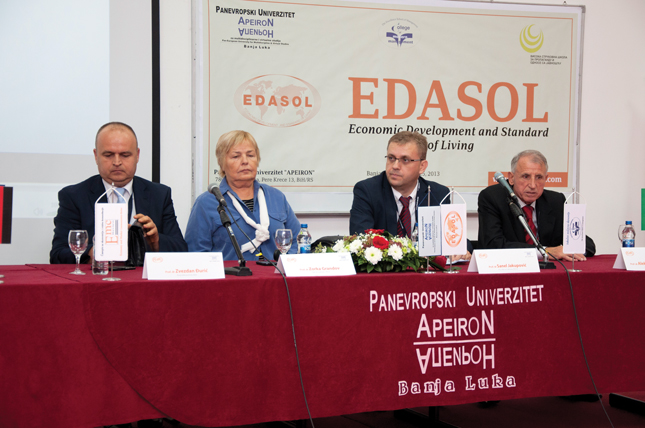
Pan-European University has organized and funded several international scientific conferences among which several are held each year as permanent international scientific congresses:
- Scientific conference of international character - Ecological safety in the postmodern environment ICAMA, dedicated to environmental issues and sustainable development;
- Scientific conference of international character – Information and Communications Technology: Surveillance development ICT:DS;
- Scientific congress – Information Technology for e-education ITeO;
- International conference – Sport Sciences and Health; Scientific conference of international character
- Sustainable development and biodiversity preservation – ICASUS;
- International scientific conference – Renewable energy sources and sustainable development;
- International conference – Violent crime;
- International scientific conference on economic development and standard of living - Economic development and standard of living – EDASOL;
- International scientific conference on marketing communications development – The power of communication.
- International scientific conference: “THE NEW AND THE TRADITIONAL IN TRANSLATION STUDIES AND IN TEACHING RUSSIAN AS A FOREIGN LANGUAGE”
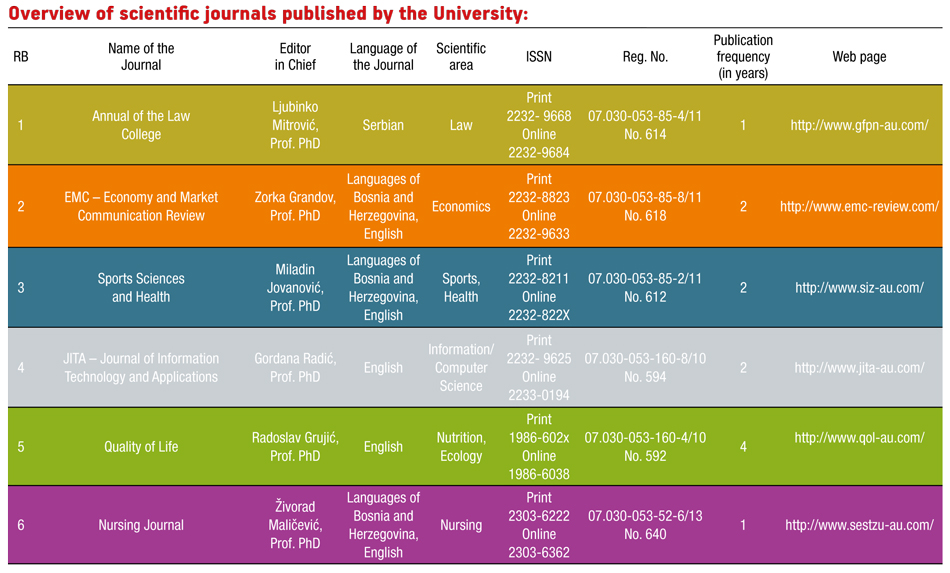

At the APEIRON Pan-European University, all academic papers are checked on plagiarism, so that the misuse of other people's papers is reduced to a minimum.
The APEIRON Pan-European University has purchased the plagiarism detection software from Ephorus, a world's leading manufacturer of software, which seems to be one of the key teaching problems in the countries of former Yugoslavia. This verifi cation method is one of the tools aimed at preserving the quality and authenticity of written papers.
This system is used to check all graduate, master, PhD theses, and other scientific papers. The Pan-European University went a step further and created, within the Publishing Centre, unique user environments to check papers on plagiarism for all teaching staff. Thanks to unique user accounts, all teachers and associates can, via WEB, access their antiplagiarism profi les which allow them to check the papers within their scientific fields. Once checked by this system, all papers become part of a worldwide database and become reference for all future checks.
According to the established academic standards and rules, up to 1/3 of the content of professional and academic papers of students and teachers may be quoted from texts by other authors in a prescribed manner with reference sources. As the academic practice at the Pan-European University is based on the provision and preservation of quality, it is clear why this approach has become part of the educational process and practice at the APEIRON University, which brought the University to the group of the most prestigious higher education institutions in Austria, Belgium, Germany, Denmark, France, the Netherlands, Nor-way, Sweden, Switzerland, the United Kingdom, the United States, where such systems are present in the educational process.
In November 2015, Apeiron expands its cooperation with institutions in Croatia by signing agreements with the North University in Varaždin and the Industrial Development Institute in Zagreb. The objective that was presented by the signatories is a joint full par-ticipation in the single European educational space. The Faculty of Business Economics of Apeiron Pan-European University and Zagreb Business School agreed that the future cooperation will promote the student mobility within the Erasmus program and strengthening of inter-institutional partnerships. The Faculty of Law in Osijek recently became a new partner of the Faculty of Law of Apeiron Pan European University.
These two faculties prioritize joint work on the opening of the doctoral school in the field of law. At the end of the year, the cooperation was established with Celje Faculty of Logistics, Maribor University. The most important point of cooperation between the these two higher education institutions is a joint participation in EU projects (Horizon 2020), as well as opening of opportunities for the establishment of a joint study on the first cycle of the business logistics programme the end result of which would be a double degree.
In February 2015, a cooperation agreement was signed between the Faculty of Business Economics of Apeiron Pan-European Uni-versity and Faculty of Economics in Subotica, University of Novi Sad. The focus of the agreement is a joint organization of doctoral studies in the field of economy between the two aforementioned higher education institutions, and the Faculty of Economics in Banja Luka. The agreement also covers the joint scientific and research work, cooperation between scientific and teaching staff members, participation in scientific conferences, seminars, scientific symposia and round tables, exchange of students and student groups.
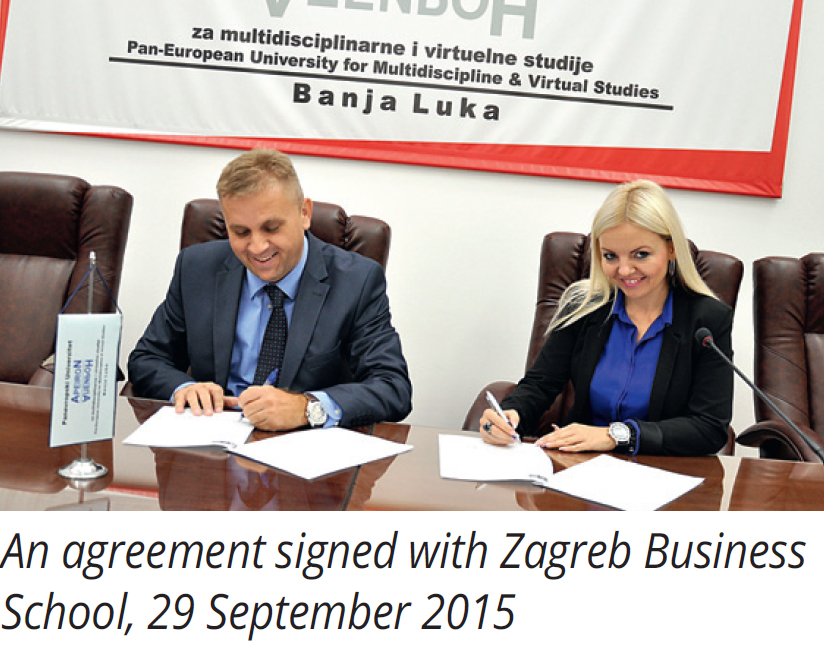
In late 2015, the Faculty of Information Technology of Apeiron Pan-European University introduced the third-cycle doctoral studies within the information systems ,communication and logistics study programmes. This doctoral programme is the result of joint cooperation Apeiron and its partners, the Faculty of Transport and Traffic Engineering in Doboj, University in East Sarajevo and the Faculty of Transport and Traffi c Engineering, University of Belgrade, in which the third cycle of stud-ies is implemented. Apeiron University has signed more than 50 cooperation agreements with universities in our country, neighbouring countries and the world, and some of these agreements are in the process of implementation and some will be implemented in the future.
Pan-European University Diplomas are recognized in: the USA, New Zealand, Austria, Germany, Russia, Serbia, Montenegro, Switzerland, the Czech Republic, Norway, Slovenia, Croatia, Sudan, United Arab Emirates, Kuwait and others.
University students have been many times rewarded with gold and silver medals at international exhibitions of ideas, innovations and creativity: „INOST 2011“ for the paper „Diff erential robotic platform SKARABEJ“.
At the 26th international festival of Innovations, Knowledge and Creativity „Tesla fest“ in Novi Sad, The Moscow International Salon of Innovations and Innovation Technology „ARCIMEDES“ awarded Mirza Ramičić, a student of the College of Information Technology for the paper „Solar-ecological robotic platform“, with the most prestigious award – the best festival innovation. For his work, Mirza was also awarded with the gold medal „Tesla fest“, and the gold medal was also given to student Rajko Gojković for the paper „Information system on the arrival of urban bus to defined stations”. At INOST 2012 our students won gold and silver plaquettes.
The tradition of excellent results continued at INOST 2013 when our students won the gold plaquette for their paper “Intelligent solar house”, and the silver plaquette for “Dancing robotic couple”.
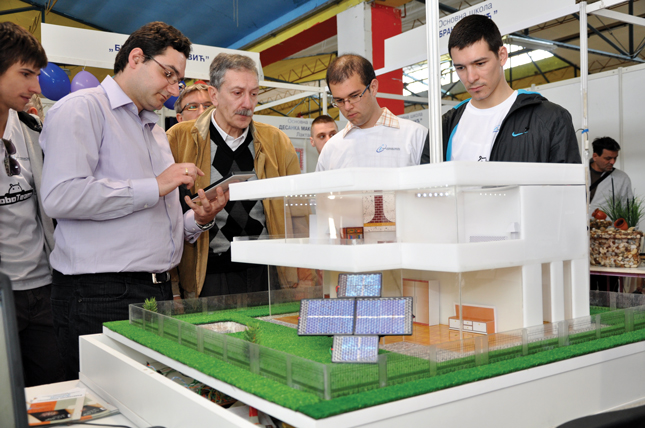
Slobodan Lukić, a student of the second year of College of Modern Management, won the second prize at the IV International Congress “The Economy of the Future”, which was in November 2014, organized by Tambov State G. R. Derzhavin University.
Our students, as members of teams and top-quality athletes take part in many kinds of sports and accomplish considerable sports results. Pan-European University students are members of the youth national football team of Bosnia and Herzegovina, members of the FC Borac first team, members of the women’s national volleyball team of Bosnia and Herzegovina, members of the national karate team of Bosnia and Herzegovina. Student of the PanEuropean University is a member of the national Street-ball team of Bosnia and Herzegovina which won the fi rst place in the World Cup held in China. Student of the College of Sports Sciences, Dragan Pešić, is a two-time world champion in martial art of K1, the fi rst and the best fi ghter of ultimate fi ght in Bosnia and Herzegovina. Student Borislav Vujanović is an amateur kickboxing world champion. Students of the Pan-European University participated in a mountaineering expedition which conquered the highest peak in South America, Aconcagua (6962 m).
Pan-European University won the fi rst place two years in a row at the traditional international futsal tournament in Banja Luka. Also, Pan-European University is the winner of the most prestigious and unoffi cially the best futsal tournament in the Balkans, which is traditionally held in Derventa. Students of the Pan-European University, College of Sports Sciences, associate athletic practice and acquire theoretical knowledge necessary for practicing high-quality sports and the improvement of sports activities.
International lingo-cultural summer school „Slavic world – unity of cultures“ (2011) was held under the auspices of the Government of the Russian Federation. The host city, Sunčev Brijeg in Bulgaria assembled students of the Slavic countries and provided students with the opportunity to, apart from learning Russian on a daily basis, participate at the festival and present their home country. Our students presented Bosnia and Herzegovina and the Republic of Srpska and won the second place in the contest with the total of 36 representatives of Slavic nations from all Slavic countries.
The mission of Pan-European University is based on an assumption that the societies of Southeast and East Europe are going through the process of changes, reforms, and transition towards a civil and democratic society, which is characterised by the parliamentary pluralism, legal system, the reign of law and market economy with the domination of private property. Social and economic transition needs a new, deeper knowledge, new perspectives, and a different approach to the economics, legal system, health care, dissemination of information, and acquiring of knowledge. In all the issues stated above, Pan-European University tends to overtake the role of the educator, and the responsibility that goes along with it.
With a slogan “School of European knowledge”, and based on the experience of socially and economically more successful and technologically developed countries, the university’s goal is clear. It tends to create experts in practical subjects, educated in multidisciplinary fields, and with the focus on the development of creative skills of the students. It is to be achieved through the process of practical training applying the contemporary educational standards. Therefore, our social mission is to educate future leaders, capable of creating sustainable social, economic and technological strategies of the country, as well as valuating the human resources which will successfully qualify the young academic generation to this mission. It is the generation that is going to face its civil and economic environment and all the challenges that the future has to offer.
Therefore, the university applies the dialogue system of teaching, which is mentor-supported. It is composed as a creative workshop of the faculty and the author's team of high professionals with pedagogic reputation, experienced in practical fields, and capable of overtaking the responsibility for their own accomplishments, and for the study outcomes of the young generation as well. The education of the students is realized through application of contemporary standards in the grading system, organization of studies, didactic methods and the curriculum, based on the best traditions of American colleges, and European universities, along with Bologna principles of reforms of European higher education.
The optimal number of elective, major and minor courses is defined, while the students are free to choose from the courses within multidiscipline study groups. This approach enables students to acquire collateral knowledge and skills among the vocational academies, functional organization units and other institutions which are parts of the university, such as: Business Incubation Center, Career Guidance Center, Public Relation Center, Publishing Center, and University Sports Center, all of which enables the students to acquire minor and major qualifications.
Theoretical and practical knowledge and skills acquired by the students during the studies are conceptualized to qualify the students for future jobs in high-tech environment, making it possible for the students to become initiative and entrepreneurial, to be able to make psychological evaluation, and to lead working groups and teams, to make decisions in a shortage of time, to continue life-long learning, to select and recognize relevant information in the abundance as well as pollution of information, to manage a number of complex projects simultaneously, and to creatively integrate theoretical and practical knowledge from different professions.
For the purposes of educational and scientific research and development, highly competent and professional personnel are employed. They are ready to take a risk and the responsibility for the renewal of their local and global communities and transformation of Bosnia and Herzegovina to the society of knowledge, and the society of learning.
Pan-European University developed multidiscipline study groups within the scientific fields neglected at public universities, even though they have the greatest potential for the future. One of its goals is implementing contemporary pedagogic technologies based on interactive teaching methods, study workshops, virtual learning environment, and application of ICT (Information and Computer Technologies) and e-Learning technologies.
A low drop-out percentage is a result of effectiveness and efficiency of the studies, attractiveness of multidiscipline courses corresponding to the future technological and social challenges, as well as psychological and entrepreneurial motivation of students.
The university promotes the principles of life-long learning, the right on equal and democratic enrolment to the university and approach to learning and education, the European transparency and mobility of the students and professors and European dimension (the values of the united Europe) in higher education. It affirms the quality assurance of higher education, the quality management system, and quality evaluation. University develops student-centered education, promoting the publicity, transparency and accumulation of al the aspects of grading system and evaluations of student outcomes, as well as achievements and knowledge managed by the students.
Pan-European University "APEIRON", in order to increase the quality of services provided to students within the framework of regular course of study as well as distance learning, has implemented the platform both for IP television and IP radio via which educational and academic videos are broadcasted in real time, and audio content respectively. The platform itself is additionally used for the delivery of video content of the recorded lectures within the Learning Cubes 4.0 distance learning system.
Pan-European University "APEIRON" broadcasts in digital format, as an interactive IP television, academic and educational-documentary television program via internet TV Channel "APEIRON TV Channel" on the WEB site www.apeiron-uni.tv. APEIRON TV Channel is an open program internet, radio and TV channel which is pointed toward common users and students, but also to all intellectually curious viewers of a new television generation. From this project can benefit not only Pan-European University students, but also young, creative and enterprising partners from academia and society.
Academic television channel APEIRON TV is a project of students and experts from the Pan-European University by which the following program activities are developed:
- news program dedicated to the events at the Pan-European University and in the academic community in Banja Luka, B&H and abroad;
- educational and scientific program dedicated to contemporary scientifi c and technological forms;
- facilities that contribute to the knowledge transfer, distance learning and life-long learning;
- the program “Quality of Life” dedicated to the quality of life with content related to the improvement of man’s humanity and habitat, current trends, environment preservation, sustainable development nutrition, healthy life, active physical exercising, developing and nurturing of mental health, social psychology;
- podcasting and webcasting of fl ash news dedicated to technology, regional political events, sports and art;
- collection, processing and publication of video and audio material, texts, photography, production and post-production of internet-radio and TV shows, as well as collection of video and photo material from mobile phones;
- documentaries dedicated to the academic community in our immediate and distance area, the European Union and local communities;
- student interdisciplinary and multimedia works;
- broadcasting of alternative film contents;
- content related to music and sports which corresponds to the interests of young people;
- within the academic TV channel, an international “pool” of academic exchange of audio and video content, documentary program, and educational-scientific program is being developed;
- within the academic TV channel, interactive media and digital technology of internet broadcasting and media integration in TV production is being explored.
As a television of youth and creativity, and a kind of workshop of modern digital audio and video technology, and as a place for promoting the improvement of higher education, APEIRON TV Channel encourages investigative journalism, scientific (research) work of students and young people and the development of modern interactive media.
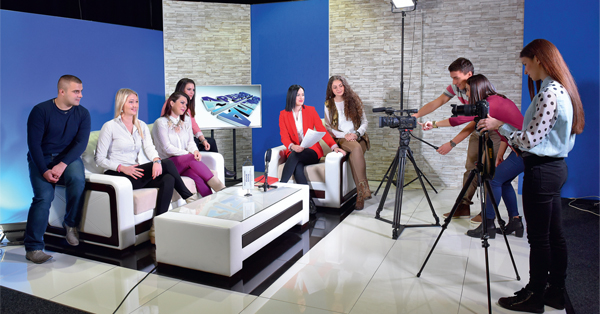
The Apeiron Student Radio started working in 2014 as an Internet radio. It is equipped with the top quality equipment and broadcasts 24-hour entertainment and educational programmes. The programme schedule is largely based on the playlists created by an experienced music editor. On the other hand, we broadcast several copyright radio shows thematically dealing with different music genres and outstanding artists, and some of them are: EX YU Jukebox, Mini Portrait, Musical Globe, Sweet Soul Music, and Interesting Facts on Fridays. The radio studio that is equipped with the modern equipment provides an excellent support to practical teaching of selected multimedia subjects in which digital sound plays an important role. In these moments, the radio studio becomes a kind of musical laboratory in which students master the technique of collecting, processing and publishing digital sound format in an interesting and creative way.
- A flexible system of the Bologna levels of higher education and transfer. A flexible system of the Bologna levels of higher education and transfer is designed, accumulation of credit points, respectively;
- In the design of study programs, a modular construction principle of the curricula with the reengineering and redefining of the traditional curriculum is applied, by which students acquire multidimensional, multidisciplinary and interdisciplinary knowledge;
- Subjects of the common basics are provided with the development of common generic student competencies parallel with academic, common-educational, theoretical-methodological, scientific and vocational-applicative, i.e. specialist competencies;
- From the beginning, an integral Bologna university is built, oriented towards students, so called “Student centered university” with the synergy of all shared resources including teaching, i.e. educational resources, i.e. university which is also a business, incubation and “career guidance” center;
- An integrated mixed model of studying and learning (blended learning) is introduced which represents the synthesis of contact teaching, distance learning and mobile education, i.e. the synthesis of various forms of the delivery of educational content and teaching methods. Modern interactive forms of knowledge transfer in the form of a dialogue and students’ active participation in educational workshops is preferred, and in which, students equally absorb and acquire the proficiency of professors who are at the same time teachers and mentors. Problem-based learning, symbiotic learning and project-based learning are applied.
The Career Guidance Centre of Pan-European University “Apeiron” was established within the framework of collateral activities of the University with the aim of creating the preconditions for organized and systematic mediation in promoting University students at the labor market for the purposes of employment, organization of internships for students, further education, and employment in home country and abroad. The Career Guidance Centre provides support to the following activities:
Career development information:
- informing and advising students;
- assistance in preparing CVs in English, German and Serbian;
- workshops, training sessions and seminars for career development;
- booklets with useful information for students.
- organisation of professional internships in promising companies, health care institutions and state institutions;
- presentation of successful companies from the region;
- meetings with employers;
- direct contact with ALUMNA Employment Agency.
- individual consulting in preparation of the “PASSPORT OF COMPETENCIES”;
- workshops in the development of business and negotiation skills;
- job interview simulations;
- consulting for continuing education in the country and abroad.
Professional Internship Programme – Become Em- ployable!! By joining the Professional Internship Programme, you will have an opportunity to gain first practical experience in the dynamic business environment, meet the business world and the way it works, and master knowledge and skills that you will need in your work. Student internships are recognized as electoral activities and are awarded a certain number of credits (3-5 ECTS) depending on the number of days spent in the internship and replace one elective subject.
TAMARA UDOVČIĆ, Faculty of Law
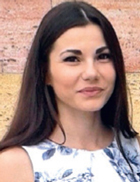
During the fourth year of studies, I had an opportunity to do the internship in the Indirect Taxation Authority, Regional Centre of Banja Luka. Through this two-week programme, I was able to upgrade knowledge acquired at the faculty. Not only did I learn about the regulations that underpin the work and within which the ITA works, but I got the opportunity to practically apply my knowledge. This internship provided me the opportunity to meet with the business environment I was about to enter. In addition, I succeeded to get rid of stage fright in communication and gain greater self-confidence in this respect, which will definitely help me in the future. As a Master student at Apeiron Pan-European University, I can only praise the work of the Career Guidance Centre and its staff members as they, year after year, allow us to acquire additional knowledge and skills through the internship programmes, not only in the ITA, but also other public and private institutions and companies.
VLADIMIR ZRNIĆ, Faculty of Information Technology
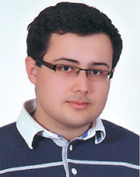
For me, the internship in the Investment-Development Bank of the Republic of Srpska is wonderful experience. In the true sense of the word, the internship was really practical and gave me an opportunity to shortly be a part of their “world” and learn about new methods and ways of functioning of large organisations as well as experience business world. This internship is a great experience for the students of the Informatics, Economics and Law at the Apeiron University in Banja Luka. Through the theoretical knowledge mastered at our faculty and this kind of practical training, we can be sure that after graduation, we will be more competitive professional staff than the others. I would recommend to every student to take advantage of this opportunity in order to acquire practical knowledge.
DUŠKO KRIVOKUĆA, Faculty of Business Economics
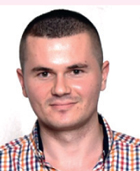
During the third year of my studies, the Career Guidance Centre of the Apeiron University offered me an opportunity to upgrade my theoretical knowledge acquired at the faculty with practical knowledge and skills in the departments of Banja Luka Raiffeisen Bank. During the internship in the retail sector, I had an opportunity to do the jobs related to internet banking, e-archive, payment cards and check lists under the supervision of mentors. The internship took one month, however, because of the hard work, commitment and expressed interest, the managers of this sector awarded me and extended the internship for two months and gave me an opportunity to further professionally develop.
„Prof. Dr. Risto Kozomara“ Fund was established on 30 March 2014, and it will award scholarships to Pan-European University students.
The objectives of the Fund are:
- Providing financial support for the most talented students of the first cycle;
- Encouraging students to scientific and research work;
- Promotion of the achieved results of scholars;
- Providing support in the development of the professional, scientific, and research career of scholars;
- Cooperation with other institutions and organizations of interest to students of the University.
The Alumni Association is a voluntary association whose members are all students who have completed bachelor, master or PhD studies at Pan-European University “APEIRON”, as well as students who are still studying, with the goal of connecting all generations of students to achieve a lasting cooperation between them.
Students become members of the Alumni Association of Pan-European University “APEIRON” voluntarily, by filling in an online application on the website of the Career Guidance Center.
By updating the database of its members, the Alumni Association enables the connection between them to support further development of their professional relationships, but also to preserve their philanthropic commitment to the University.
By collecting and organizing information about the actual supply and demand in the labor market for educational profiles of the University, the Career Guidance Center provides students with the actual state of the labor market needs, and in cooperation with the Agency “ALUMNA”, it connects them with potential employers.
In cooperation with its partner institutions from the Republic of Srpska, Bosnia and Herzegovina, and abroad, the Agency “ALUMNA” provides graduate nurses and physiotherapists from College of Health Care and Nursing with jobs in Germany.
Students who are interested in working abroad have the opportunity, through the Agency and the Career Guidance Center, to attend foreign language courses, to test their knowledge of the German language, and to receive an official certificate (ÖSD) which is recognized in all German-speaking countries.
After graduation and obtaining the Certificate B2, graduate nurses and physiotherapists, who want to work in Germany, can apply for a work permit at the Agency “ALUMNA” and get in touch with the employer.
Study programs
- Business Administration and Entrepreneurship
- Banking, Finance and Trade Management
- Public Administration and Governance
- Bachelor degree of the first cycle of studies in the period of 3 years (6 semesters) – 180 ECTS
- Bachelor of Business Administration and Entrepreneurship (B.BA) - 180 ECTS (Study program: Business Administration and Entrepreneurship)
- Bachelor of Banking, Finance and Trade Management (B.BFT) - 180 ECTS (Study program: Banking, Finance and Trade Management)
- Bachelor of Public Administration and Governance (B.PubAdmin.&Gov.) - 180 ECTS (Study program: Public Administration and Governance)
- Studies of the first cycle in the period of 4 years (8 semesters) – 240 ECTS – with or without narrow field of study/specialist degree
- Bachelor of Business Administration and Entrepreneurship - 240 ECTS (Specialist in the field of … / BScBA spec. in …)
- Bachelor of Banking, Finance and Trade Management - 240 ECTS (Specialist in the field of Banking, Finance and Trade Management / BSc.BFT spec. in …) Bachelor of Public Administration and Governance - 240 ECTS (Specialist in the field of … / B.ScPubAdmin.&Gov. spec. in …)
- Business Administration and Entrepreneurship
- Master of Business Administration and Entrepreneurship
- Master of Business Administration and Entrepreneurship (… in the field of … / MScBA)
- Banking, Finance and Trade Management
- Master of Banking, Finance and Trade Management - 300 ECTS
- Master of Banking, Finance and Trade Management - 300 ECTS (… in the field of Banking, Finance and Trade Management / MScBA in Banking, Finance and Trade Management)
Study programs
- General Law study program
- Business Law
- Bachelor degree of the first cycle of studies in the period of 3 years (6 semesters) – 180 ECTS
- Bachelor of Law - 180 ECTS (LL.B.)
- Bachelor of Business Law - 180 ECTS (LL.B. in Business Law)
- Studies of the first cycle in the period of 4 years (8 semesters) – 240 ECTS – with or without narrow field of study/specialist degree
- Bachelor of Law - 240 ECTS (Specialist in ... / LL.B. spec. in ...)
- Bachelor of Business Law - 240 ECTS (Specialist in ... / LL.B. spec. in ...)
- Master of Law
- Master of Law (... in the field of ... / LL.M.)
Study programs
- Health Care and Nursing;
- Health Care Management
- Physiotherapy and Occupational Therapy
- Sanitary Engineering
- Medical Laboratory Engineering
- Bachelor degree of the first cycle of studies in the period of 3 years (6 semesters) – 180 ECTS
- Bachelor of Health Care and Nursing (B.HCN) - 180 ECTS
- Bachelor of Health Care Management (B.HCM) - 180 ECTS
- Bachelor of Physiotherapy (B.Physioth.) - 180 ECTS
- Bachelor of Sanitary Engineering (B.San.Eng.) - 180 ECTS
- Bachelor of Medical Laboratory Engineering (B.Med.Lab.Eng.) - 180 ECTS
- Studies of the first cycle in the period of 4 years (8 semesters) – 240 ECTS – with or without narrow field of study/specialist degree
- Bachelor – Specialist of Health Care and Nursing (B.Sc.HCN) - 240 ECTS
- Bachelor – Specialist of Health Care Management (B.Sc.HCM) - 240 ECTS
- Bachelor – Specialist of Physiotherapy and Occupational Therapy (B.Sc.Physioth. & OT) - 240 ECTS
- Bachelor – Specialist of Sanitary Engineering (B.Sc.San.Eng.) - 240 ECTS
- Bachelor – Specialist of Medical Laboratory Engineering (B.Sc.Med.Lab.Eng.) - 240 ECTS
Master studies of the second cycle in the period of 1 to 2 years (2-4 semesters) – 300 ECTS (with Master Thesis Defense)
Study programs
- Health Care and Nursing
- Master of Health Care and Nursing
- Master of Health Care and Nursing (... in the field of ... / M.Sc.HCN)
- Health Care Management
- Master of Health Care Management – 300 ECTS-credits
- Master of Health Care Management – 300 ECTS-credits (… in the field of …)
- Sanitary Engineering
- Master of Sanitary Engineering
- Master of Sanitary Engineering (... in the field of... / M.Sc.San.Eng.)
College is primarily engaged in the basic scientific fields of human-biology (anatomy, histology, embryology, physiology, genetics, cytology), microbiology, bio-chemistry, clinical-chemical and physical-functional fields of science, then in the area of general medical science, applied medical sciences, propedeutics and health care in different branches of medicine and clinical-hospital practice, pharmacology and toxicology, dietetics, geriatrics, epidemiology, medical and developmental psychology, sports medicine, social medicine, medicine history and ethics.
In the broader scientific field of physiotherapy and occupational therapy, college is primarily engaged in physical medicine and physiotherapy within various fields of medicine and clinical-hospital practice, kinesiology, kinesiometry and biomechanics, prosthetics and orthopedics, balneology, occupational therapy and rehabilitation in different types of diseases and disabilities, occupational therapy in community, occupational therapy in psychosocial disorders and ergonomics.
College is primarily engaged in the fields of laboratory medicine that are associated with the above-mentioned narrow scientific fields.
Study programs
- Information Technology Engineering
- Computer Science Education
- Bachelor degree of the first cycle of studies in the period of 3 years (6 semesters) – 180 ECTS
- Bachelor of Computer Science and Information Technologies - 180 ECTS (Study program: Information Technology Engineering / B.IT)
- Bachelor of Information Technologies and Technical Education - 180 ECTS (Study program: Computer Science Education)
- Studies of the first cycle in the period of 4 years (8 semesters) – 240 ECTS – with or without narrow field of study/specialist degree
- Bachelor of Computer Science and Information Technologies - 240 ECTS (Specialist of Computer Science B.Sc.IT – spec. CS)
- Bachelor of Computer Science Education - 240 ECTS
Study programs
Information Technology Engineering
- Master of Computer Science and Information Technologies - 300 ECTS
- Master of Computer Science and Information Technologies - 300 ECTS - 300 ECTS (... in the field of …)
College is primarily engaged in the basic scientific fields of computer science (programming basics, the theory of algorithms, computer system architecture and organization, operating systems, network computing, programming languages, software engineering - modeling, software analysis and design, software management, human-computer interaction, graphics and visualization, artificial intelligence, information management - the theory and practice of databases, relational and distributed databases, legal, ethical and professional aspects of computer science), the field of information technology (safety and information security, platform technology, administration and maintenance of IT systems, technical support ), the field of information systems (system-analysis and logical design of IS, information system design, implementation of information systems, maintenance of information systems, the development of specific types of IS, distributed systems), the field of computer engineering (computer system engineering, networking and telecommunications) and in the secondary scientific fields which are also studied at the College, and which are the basis of interdisciplinary approaches: (mathematical analysis, discrete mathematical structures, the theory of algorithms, probability and statistics, numerical methods and operational research, general system theory, organization theory, decision theory, information theory, project management, educational informatics, cryptography, e-business, change management, human (interpersonal) relations and communication skills.
Read more...Study programs
- Sports Management
- Sports Training & Coaching
- Sport Science Education
- Bachelor degree of the first cycle of studies in the period of 3 years (6 semesters) – 180 ECTS
- Bachelor of Computer Science and Information Technologies - 180 ECTS (Study program: Information Technology Engineering / B.IT)
- Bachelor of Sports Science in Sports Management - 180 ECTS (Study program: Sports Management)
- Bachelor of Sports Science in Sports Training & Coaching - 180 ECTS (Study program: Sports Training & Coaching)
- Bachelor of Sports Science in Sports Management - 240 ECTS (Specialist in the field of … / B.Sc.Sport Mng.)
- Bachelor of Sports Science in Sports Training & Coaching - 240 ECTS (Specialist in the field of ... /B.Sc.Sport Coch.)
- Teacher of Physical Education - 240 ECTS (... in the narrow field of ... / specialist degree)
- Master of Sports Management – 300 ECTS-credits Sport in Target Groups
- Master of Sports Science – 300 ECTS-credits
-
Academic studies of the first cycle
Study programs
Sports Management
College is primarily engaged in the basic scientific fields of sports sciences: biological and medical sports basics, biomechanics and anthropomotorics, statistics, computer science and methodology in sport, pedagogy and psychology of sport and exercise, sociology, philosophy and ethics of sport, economics and sports management, sports theory and science of training, individual sports and sports fields, rhythmic gymnastics and dance, basic motor activities, sports and recreation activities in nature, and sports in selected target groups, as well as in the secondary scientific fields studied at the College, which are the basis of an interdisciplinary approach: sports medicine, sports tourism and wellness, pharmacology and toxicology, nutrition and dietetics, physical medicine and rehabilitation, sports massage, balneology.
Read more...Study programs
- Teaching and Translation study program of Russian Language
- Russian Language
Students who have completed a three-year study of the study program “Teaching and Translation of Russian language” have the possibility to continue their studies in the fourth year of the study program “Russian Language” and to obtain the academic title “Teacher of Russian Language and Literature” - 240 ECTS (secondary school teacher).
Upon completion of studies, students can successfully position themselves in the labor market: in the oil industry, corporate systems, monitoring and inspection services, professional institutions, cultural institutions, design offices, insurance companies, and in elementary schools (Teaching and Translation study program). Among individual professions, court interpreters and internation-al correspondents dominate.
Students acquire knowledge at a level that allows active use of the Russian language, the use of scientific literature in Russian and in some other Slavic languages, understanding and interpreta-tion of literary texts. Students also develop the ability to link knowledge gained in the field of Russian disciplines, as a narrow scientific field, to a wider social and cultural context, and create critical thinking on the problems in this area.
In addition to the above mentioned, students of both study programs will have the following competences:
- ability of continuous improvement of the general level of the Russian language usage, in written and oral form;
- gaining universal habits of translating;
- studying translation strategies and models;
- active practical application of the theoretical knowledge acquired in the field of cross-language and cross-cultural communication;
- working with special terminology and expanding of terminology apparatus in a specific professional area;
- practical work with texts from a particular narrow profession;
- improvement of the skills in the usage of the Russian language in different language (functional) styles.
Students of the Teaching and Translation study program master the latest translation technolo-gies, information technologies in the service of translation, acquire professional skills of interpret-ing and translation.
The program further allows to apply the knowledge gained in working with different types of text, its translation and editing, to acquire the skills of simultaneous interpretation, business com-munication skills in Russian language, and preparation of documentation.
Courses are taught by the professors of the Department of Russian Language and Literature of the College of Philology, Pan-European University “Apeiron”, as well as by the highly qualified specialists of the MGU Translation School and St. Petersburg Translation School, with whom the University has signed agreements on long-term cooperation, experts in the field of theory and practice of translation with personal experience in the field of interpreting and translation, i.e. scientific-technical, socio-political, and literary translation. Our professors in the Department of Russian Language and Literature have been cooperating for many years with the MGU Transla-tion School, since their establishment in 2005, and every year, they participate in international conferences on translation, organized by this school. Pan-European University “Apeiron” has signed an agreement on educational, scientific, and aca-demic cooperation with the prestigious “LOMONOSOV” Moscow State University.
Read more...
Study programs
- Traffic & Transportation Engineering
- Bachelor degree of the first cycle of studies in the period of 3 years (6 semesters) – 180 ECTS
- Bachelor of Traffic Engineering – BTE - 180 ECTS (Bachelor of Traffic Engineering - BTE)
- Studies of the first cycle in the period of 4 years (8 semesters) – 240 ECTS – with or without narrow field of study/specialist degree
- Bachelor of Traffi c Engineering – 240 ECTS (Bachelor of Traffic Engineering – specialist in Road and City Transport (BTE spec. in road & city transport)
Descriptors of the first cycle of the Traffic Engineering studies
By mastering the study program, students gain a thorough knowledge and understanding of the engineering disciplines in the traffic and transport field, as well as the ability to solve practical problems using scientific methods and procedures. Given the interdisciplinary nature of the study program, the ability to incorporate basic knowledge from various fields and apply it is extremely important.
“Traffic and Transportation” graduates are able to properly put together and present the results of their work. Competence of graduates of the study program “Traffic and Transportation”, or “Traffic Engineer”, is reflected in the ability and willingness to work independently:
COLLEGE OF MODERN MANAGEMENT
- Business Administration and Entrepreneurship • Academic titles - Master of Business Administration and Entrepreneurship - 300 ECTS (one-year and two-year master’s studies) (Fields: Corporate entrepreneurship; Strategic management and geopolitics; Project and investment management; Small enterprises and micro-credits; Transitional re-engineering; International marketing management; Conflict and crisis management; Standardization and quality management; Technology forecasting and innovative entrepreneurship; Team development and communication skills; Environmental management and sustainable development,…)
- Banking, Finance and Trade Management • Academic titles - Master of Banking, Finance and Trade Management - 300 ECTS (one-year and two-year master’s studies) (Fields: Bank marketing management; Export and trade management; Management of freight forwarding, logistics, and insurance; Tourism and hotel management; Tax management, market business audit and control; Stock market and portfolio management,…)
COLLEGE OF INFORMATION TECHNOLOGIES
- Information Technology Engineering • Academic titles - Master of Computer Science and Information Technologies - 300 ECTS (one-year and two-year master’s studies) (Fields: Information system design and development; Information system management of public administration; Computer network administration and management; Software engineering, Electronic business (e-commerce, e-banking, e-marketing); Computer graphics and design; WEB programming and design, Information management; IS Security management – crypto & cyber protection; Computer system architecture, organization, and maintenance; Expert systems,…)
LAW COLLEGE
- General Law study program • Academic titles - Master of Law - 300 ECTS (one-year and two-year master’s studies) (Fields: Economic/civil law; Judicial/criminal law; Forensic/criminal law; General/international law; Communitarian/European law; Case/American law; Administrative law; Labor/social law; Constitutional/political law; Theoretical/historical law; Legal information technology and documentary; Team development and communication skills; Human resource development and public relations; Conflict and crisis management,…)
COLLEGE OF HEALTH SCIENCES
- Health Care and Nursing • Academic titles - Master of Health Care and Nursing - 300 ECTS (one-year and two-year master’s studies) (Fields: Intensive medical and urgent care; Nutrition and dietetics; Infectology care; Internal medicine patients care; Pediatric care; Surgical patients care; Surgical instrument assistant; Geriatric care; Obstetric-gynecological care; Primary medical care and family medicine; Oncology patients care; Psychiatric patients care; Neurology care; Ophthalmology care; Radiological engineering; Anesthesiologist assistant; Dental assistant.,...)
- Sanitary Engineering • Academic titles - Master of Sanitary Engineering - 300 ECTS (one-year and two-year master’s studies) (Fields: Nutrition and dietetics; Environmental engineering; Sanitary technology and water management; Sanitary technology and food management; Sanitary management and air management; Sanitary technology and waste management; Sanitary and environmental legislation and supervision.,...)
- Health Care Management • Academic titles - Master of Health Care Management – 300 ECTS-credits (one-year and two-year master’s studies) (Fields: Specialist study in public health and health care; Clinical and hospital institutions management; Portfolio management of health funds and insurances; Team development and communication skills in health care; Human resource management and public relations; Medical informatics and documentary.,...)
COLLEGE OF SPORT SCIENCES
- Sport in Target Groups • Academic titles - Master of Sports Science - 300 ECTS-credits (one-year studies) (Fields: Health sport, Recreational sport, Fitness, Sport of target groups (children, elderly people, disabled people, etc.), Therapeutic sport, Wellness, Sport tourism, Extreme sports, Theory of a selected branch of sport, Sport strategy and tactics, Theory of games, Training science, Diagnostics in sport, Physical preparation in selected branches of sport, Didactics and methodology of sport, Theory and practice of competition, etc.)
- Sports Management • Academic titles - Master of Sports Management - 300 ECTS-credits (one-year and two-year master’s studies) (Fields: Phenomenology and sociology of sport, Law and ethics in sport, Social history of physical activities and sports, Sports informatics and statistics, Functional anatomy, Physiology of sports activities, Biomechanics, Anthropomotorics, Economics of sports organizations, Sports marketing, Psychology of sport, Pedagogy of sport, Didactics of sports training, Financial, strategic, and conflict management in sport and management of sports events and facilities, Sport strategy and tactics, Theory of games, Training science, Didactics and methodology of sport, Theory and practice of competition, Health sport, Recreational and entertainment sport, Sport of target groups (children, elderly people, disabled people, etc.), Therapeutic sport, Wellness, Sport tourism, Extreme sports, and other forms of group exercise).
Any person who has completed a four-year study program of the first cycle (240 ECTS-credits or equivalent) may apply for admission to the studies of the second cycle. The duration of studies is two semesters, i.e. one academic year (60 ECTS-credits). Candidates who have completed a three-year study program of the first cycle (180 ECTS-credits) may also enroll in the studies of the second cycle, but in this case the duration of studies is four semesters, i.e. two academic years – 120 ECTS-credits (in the study program Sport in target groups may enroll only candidates who have completed a four-year study program of the first cycle – 240 ECTS-credits or equivalent). Students who have completed the studies of the second cycle and acquired a minimum of 300 ECTS-credits, and have written and defended the final thesis, are awarded the title of “master” in a selected field of science, depending on the legal provisions governing the use of academic titles and the attainment of scientific and professional titles.
Read more...
Since the school year 2015/2016, access to the distance learning system is free, i.e. it is included in the tuition costs (electronic books, recorded lectures, audio recordings, electronic presentations of teaching content, video clips, access to licensed databases, etc.)
Since the school year 2015/2016, access to the distance learning system is free, i.e. it is included in the tuition costs (electronic books, recorded lectures, audio recordings, electronic presentations of teaching content, video clips, access to licensed databases, etc.) All students of Pan-European University “APEIRON” have full access to the distance learning system. Each student receives user data to access the multimedia content relating to subjects they have.
All content within the system is logically organized which allows easy use and satisfaction at work. Distance learning system Learning Cubes 4.0 reduces students’ travel costs, provides access to textbooks and presentations as well as flexibility of learning in every respect.
Distance learning system Learning Cubes 4.0 is an upgrade of classroom teaching, be it classical teaching or teaching supported by ICT and computer multimedia, with the aim of enriching knowledge in a new and interesting way by giving the user the option of complete control to manage multimedia content published within the distance learning system.
About 10,000 hours of video recordings of different teaching activities have already been published within the distance learning system!
Distance learning is an imperative of the modern educational system which should provide life-long learning (Bologna principle of »life-long learning«) and represent an educational support to modern post-industrial knowledge society, which in that way grows into learning society. When a student com-pletes the first part of studies and takes over any kind of social function (work, family, political, socio-cultural and other responsibilities), he/she can no longer upgrade his/her knowledge in a traditional way „from the classroom“, and during the life career he/she will have constant educational needs. The only way to reconcile this apparent contradiction (modern educational needs and traditional educa-tional methods and forms) is through flexible educational models, which apart from traditional meth-ods of learning also include distance learning and informal models of education. In the USA, all accredited higher education institutions offer distance education as a legitimate form of study.
Distance learning is, according to the Law on Higher Education of the Republic of Srpska (Article 34 of the Official Gazette of the Republic of Srpska, No. 73/10), defined as a teaching method, i.e. as a meth-od of performing teaching and studying process which can actually be applied to regular and extraordi-nary studies. With this approach of the Ministry of Education and Culture of the Republic of Srpska, the elements of distance learning, as methodological forms, are enabled at full capacity also to regular stu-dents.
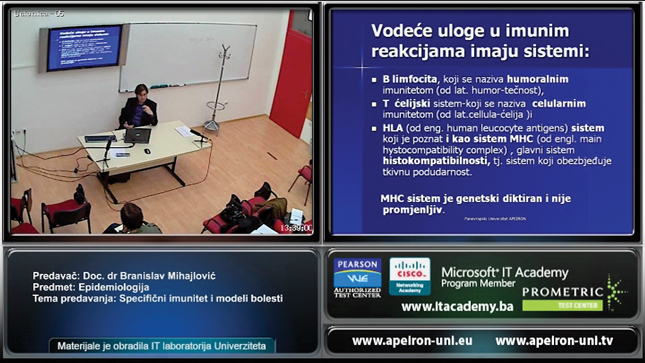
Pan-European University APEIRON has been running distance learning studies since the academic year 2007/08 based on the decision on eligibility for commencement of work issued by Ministry of Education and Culture of the Republic of Srpska No. 07.2-4777/07 from 01/08/2007, and license issued by Ministry of Education and Culture of the Republic of Srpska No. 07.2-9624/07 from 28/12/2007. Pan-European University has been also issued with a special license for running distance learning studies by Ministry of Education and Culture of the Republic of Srpska No. 07.2-9624-1/07 om 28/12/2007.
Therefore, Pan-European University, by defining its mission and perceiving trends in the development of modern society, set as one of its strategic goals development and implementation of distance learn-ing. In order to achieve credibility of distance learning in conditions of misunderstanding by traditional academia and legitimize this form of education, Pan-European University has invested considerable personnel, logistics, research, material and financial resources in the development of this model of studies. At the Pan-European University, the teaching process in the distance learning system is orga-nized as a kind of synthesis of traditional educational forms, innovated in the form of interactive teach-ing, and modern educational forms of distance learning, technologically strongly supported by ICT.
All Pan-European University students have open active accounts for access to a protected WEB distance learning module, which enables them to effectively prepare for the exams by using appropriate learning sources placed through the system.
The recourses of distance learning system are available to all students regardless of the form, type, level, and place of studying.
a/ material support in the distance learning system:
At the Pan-European University, all classrooms, both in the headquarters and in licensed University departments, are digitized and equipped with multimedia equipment for the acquisition of digital con-tent, and professional teleconferencing, i.e. telecommunications equipment, which enables the use of modern methods of distance learning teaching process. Laboratory for Information/Communication Technology is specially equipped for the development and maintenance of Internet service introduced at the University, and for the development of multimedia applications and information-safety system.
At the Pan-European University, an integral university information system has been introduced, and information system of distance learning support. University “APEIRON” is the Microsoft IT Academy Platinum Pro partner in the area of education and implementation of Microsoft technology, and also a licensed test center in the world systems “Promet-ric” and “Pearson Vue”.
b/ logistic support:
All lectures, exams, and other educational activities, including the educational activities performed in classrooms, clinics, or outside (for example some activities in sports science), are recorded, digitally processed at the Laboratory of information and communication technologies, and then optimized for distribution in the system of distance learning and for control functions.
In order to provide a textbook support in the system of distance learning, University “APEIRON”, as a licensed publisher and through a network of agreements on the protection of copyright in their own publications, has provided all textbooks, presentations, and other written sources in electronic form, and published them in writing and in electronic form of web publications.
Through mobile computing platforms (tablets and smart phones), or the so-called smart TV, each student who is active in the distance learning system of education has access to the following:
- Video recordings of all held lectures, and recordings of all lessons and other teaching activities for each individual subject including presentations which were used during the teaching activities in a single timeline;
- Audio recordings, i.e. audio extracts from recorded lectures;
- Textbooks which are used for the analysis of subjects in hypertext electronic form and PDF format;
- All other sources in written form which are used in subject analysis are available in the electronic form;
- Electronic presentations of all teaching content;
- Audio version of the majority of textbooks in the form of so called audio-books;
- Video clips, animations, a series of photographs and slides in electronic form which are used as addi-tional teaching resources;
- Access to licensed databases, scientific periodicals, and access to licensed study databases to which the Pan-European University is subscribed;
c/ organization of the teaching process in the distance learning system
In remote locations, teaching in the distance learning system is provided by the projections of all lec-tures which are recorded in the Pan-European University headquarters, according to designated and published schedule. Also, students are able to individually follow all lectures at any time over the Inter-net, via secured distance learning WEB module, which allows watching of all lectures many times again. Recorded lectures and presentations for each individual subject are available to students via optic me-dia, DVD respectively. Students access teaching resources in the distance learning system via a secured distance learning module on the University website. In this way, students have access to electronic books (published in HTML and PDF format), electronic presentations developed by subjects, as well as lectures that are recorded for each subject and teaching block, lesson respectively. Students also have access to the textbooks in the form of audio-books, which can be accessed via Internet site of the dis-tance learning system.
Professors perform written consultations with students via e-mail. Every professor and student has an open e-mailbox within the University information system. Professors are obliged to conduct dedicated electronic correspondence with students in the form of brief consultations and operative answers to the questions. In the distance learning system, students are provided over the weekend (on Friday afternoons and Saturdays) with a direct contact study performed by responsible professors and other employed aca-demic staff in the scope of no less than one-third of the contact study for regular students, and direct or on-line video consultations in the scope of 6 lessons. Classes held for regular students are broad-casted from the University headquarters to all licensed Pan-European University departments over the Internet. Since the broadcast is being performed with the equipment for professional teleconferenc-ing, in this way, full participation and interaction is provided to students in remote locations.
Practical classes, laboratory, clinic, sports and work practice are organized for students in the distance learning system in institutions and organizations with which the University has signed agreements on business, technical and academic cooperation, and whose allocation corresponds to the distribution of residence of students studying in the distance learning regime. Students, for whom, practical, laborato-ry and clinic classes cannot be provided, the realization of these program facilities in a condensed form is enabled at the institutions of the Pan-European University immediate surroundings in the frame-work of dedicated winter and/or summer seminar/campus which is organized for a period of 7-14 days.
d/ exam activities in the distance learning system
In the distance learning system, oral exams are being held directly at the university headquarters dur-ing the weekend, or in licensed University departments. Oral exams are also being held via teleconfer-encing from the headquarters in Banja Luka to licensed University departments. Exam conditions at remote locations are controlled by responsible teaching staff or authorized person – so called “proctor” who create the appropriate protocol, i.e. record of exam. Written exam or pre-exam activities in the form of written or electronic tests, written exams with questions, or micro essays are organized for this category of students both in the University headquar-ters and in licensed departments. Other written resources for student evaluation such as seminar pa-pers, essays and projects are submitted to the professor responsible for the task of review and evalua-tion in electronic or written form via Student Service. Defense of diploma thesis and specialist paper is organized in the headquarters and in licensed de-partments via teleconferencing. Master Thesis defense is organized exclusively at the Pan-European University headquarters.
Legal basis
Pan-European University possesses a license to perform the studies of the first cycle of the following study programs: Business Administration and Entrepreneurship; Banking, Finance and Trade Management; General Law; and Information Technology Engineering outside the headquarters, in Bijeljina and Novi Grad departments.
Pan-European University is also the founder of the Higher Vocational School for Market Communications in Belgrade, accredited in the Republic of Serbia under the number: 612-00-00657/2013-04 from 8/11/2013, which performs accredited study programs: Propaganda and Public Relations; Translation Studies of the English Language; Internet Technologies and Electronic Business; and Advertising and Public Relations (specialist studies). This Higher Vocational School is also the study support center for Pan-European University students in Serbia.
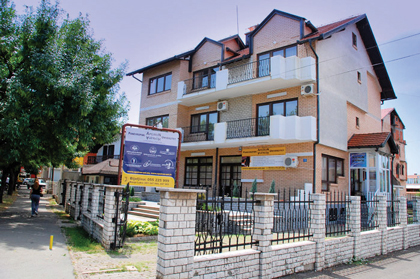
Pan-European University has a study support center for students in Doboj.
In accordance with the Law on Higher Education of the Republic of Srpska, Pan-European University has, by the University Statute, Regulations on the studies of the first and second cycle, Regulations on the evaluation and achievements of students, Regulations on virtual studies and distance learning, closely defined the method of teaching and the system of evaluation (grading) both in regular and ex-traordinary studies, i.e. the methodology of performing distance learning.
All students of the Pan-European University are formally and legally enrolled at the Pan-European Uni-versity as an integral university. Colleges, departments and internet centers are not legal entities, but organizational facilities; therefore, the formal admission of students into appropriate study programs is being done at the university with its headquarters in Banja Luka. The Register of enrolled students is kept in the University headquarters in Banja Luka. Students receive Pan-European University diplomas indicating the study program they have completed at the appropriate college, and without referencing the location where the teaching process took place.
Support for students who study outside the University headquarters
Licensed University departments enable the organization of the teaching process outside the head-quarters at full capacity in study programs for which the work permit in those departments has been issued. Departments, i.e. internet centers at the same time can (and must) provide appropriate infor-mation, communication, professional, consulting, logistic and administrative support to all students from a geographic area covered by the department (internet center) regardless of the enrolled study program:
a/ administrative and technical support:
- Information and technical support upon enrollment at all study programs in providing information, re-ferring of admission, technical, educational and marketing material related to the registration and col-lection of students’ applications, marketing support in organizing and performing of marketing cam-paigns related to admission for all study programs;
- Receipt of all written students’ submissions and their sending to the headquarters, and providing feedback to the applicant;
- Providing information on classes schedules for all study programs in the university headquarters and departments for all student categories, regular, extraordinary and students who use distance learning resources;
- Collection, control and forwarding of students’ exam registrations to responsible academic staff;
- Defining lists of students from the area of departments where the classes are performed for extraor-dinary students and admissions for examinations;
- Providing information related to student services (exam dates, examination results, etc.);
- Organizing and collecting students’ surveys.
b/ professional and technical support:
All Pan-European University students are provided, via the department or internet centers, with access to information and educational resources and knowledge bases that are of public property and availa-ble on the internet, especially students who do not have adequate broadband high-speed internet, furthermore, students are provided with access to those resources that are not of public property, and to which the Pan-European University is subscribed (such as for example EBSCO academic database of scientific and technical information, articles and other scientific publications to which the Pan-European University is subscribed). The departments, i.e. internet centers, also provide access and effective use of the Pan-European recourses that are in electronic form published on the Internet by the local Pan-European University network. This includes services (for which is assumed to have broadband Internet access) available to students on the University WEB site, such as electronic bulletin boards, university web mail service, university FAQ service, access to forums and other forms of academic social networks that are organized at the university, access to resources of the University Career Guidance Center, electronic exam registration, e-surveys, Pan-European University e-library services, LMS system services (Learning-Management System) for distance learning, services of the University educational television “Apeiron TV Channel” and others.
Internet centers (in departments or independently organized) are designed to provide multi-functional support to students, which includes not only distance learning support but also support for student projects and student research work. In addition, they provide the following functions:
- Access to the Internet via broadband high-speed connection that provides a fast, efficient, comforta-ble and quality work on the Internet in terms of content download from the Internet, as well as upload of the queries and results of student work (e.g. sending term papers and other written work via the university Web mail service).
- They also provide a sufficient number of multimedia computer systems that are connected to the local network of the internet center itself. The multimedia features of the computer provide video and au-dio communication in educational forums and online sessions that are organized at the headquarters of the university and other organizational facilities of the university, direct on-line communication and consultation with professors, professional associates or fellow students in specific interest and work groups of students.
- Additionally, they provide access to other input-output network devices (printers, plotters, scanners) and other electronic equipment that is installed in the local network of the departments, thus creating conditions for free support to all Pan-European University students in printing and scanning of docu-ments, working with computer graphics, doing seminar and other student papers, research activities and student practice.
- Internet centers are designed to enable group, collaborative and traditional individual studying, be-cause in addition to computer equipment they are equipped as standard academic libraries. Each cen-ter is equipped as a branch library of the Pan-European University.
- Internet centers provide students with a direct insight into a part of the teaching process that takes place at the Pan-European University via on-line teleconferencing, as well as a direct insight into the teaching process that takes place at the Pan-European University headquarters, and is broadcasted via video streaming. This service especially refers to students who do not have adequate access to high speed broadband Internet. Internet centers are fully equipped with all the necessary audio equipment, video projection and tele-conferencing equipment. Within the Pan-European University internet centers responsible for distance learning support, a cer-tain professional and educational support is provided to all students, regardless of their enrolled study program.
(1) Studying, individual and group work of students
- Individual studying via the Internet, access to the Pan-EuropeaUniversity distance learning system and other knowledge bases and educational resources on the Internet;
- Individual studying by means of written sources and printed books in the Internet center libraries;
- Group-studying via the Internet within educational internet forums which are, for each subject, i.e. a narrow scientific field, formed in the distance learning system;
- On-line oral and written consultations with the teaching staff and associates;
- Collaborative studying in work groups in the classrooms of the Internet Centre;
- All forms of student practice and research projects that require computer, telecommunications and information technology support;
(2) Teaching activities
- In the Internet centers organized in the departments, only consultative, i.e. instructional classes are organized. The classes will not be held for study programs that have a license to be performed at the University headquarters in Banja Luka, and are not licensed in certain departments. Full teaching pro-cess for this category of students (extraordinary students) is organized at the University headquarters, on Friday afternoons and during every weekend, to the extent which is not less than one-third of all teaching material that is supplied to regular students.
- Internet centers organized in the departments or independently will provide support to all Pan-European University students in order to gain insight into the teaching process via video streaming or archival projections of lectures held at the Pan-European University in the reading rooms, i.e. regional university library. Furthermore, teleconferencing provides support for participation and active in-volvement of students in various educational events held at the Pan-European University, such as seminars, scientific conferences, round tables, etc.;
- Internet centers will, if necessary, or upon the request of students organize ad-hoc consultations with mentors, tutors, teaching staff and associates;
- Seminars, conferences, round tables and various forms of educational workshops that are organized in the departments are available to all Pan-European University students;
- Internet centers will also serve as a support for student research projects;
(3) Knowledge evaluation
In the departments’ internet centers examinations will be organized for all Pan-European University students from subjects that have common basics of the study cycle, i.e. common basics of a broader scientific field, and which are held at the Pan-European University (as an integrated university) accord-ing to the unique program for all study groups and for which, in the process of teaching and knowledge evaluation specific teaching groups are organized. Pan-European University will organize examinations outside the headquarters of the university for subjects whose nature requires it, in accordance with the provisions of the Article 46 of the Law of Higher Education, and based on the curriculum of these subjects and in accordance with the University Statutes and Regulations on the evaluation of knowledge and achievement of students. In certain study programs, a number of clinical and laboratory subjects fall into this category, as well as practice, internships and volunteering, which are also being graded in the ECTS system. In order to provide effective support to these subjects and students’ activities, Pan-European Universi-ty has concluded appropriate contracts on academic, business and technical cooperation with regional clinical, spa and laboratory facilities, so that students, in this part of their studies, could receive appro-priate, close, more efficient and quality support.
- Upon the request of students, internet centers can organize only those knowledge evaluations which are part of students’ pre-exam requirements, and which are performed on computers via direct, pro-tected, encrypted and immediate connection to the Pan-European University server system in Banja Luka, and within the standardized software LMS (Learning Management System) package;
- Evaluation activities within students’ pre-exam requirements are carried out practically via global com-puter network in the Pan-European University server system, because every computer of the Internet center is actually a part of the Pan-European University WLAN;
- Evaluation activities within the domain of pre-exam requirements take place in a controlled environ-ment with provided physical and technological protection of the evaluation process using the following instruments;
- Authentication access of each student to any computer system in the Internet center based on the card reader that loads the student card for which an individual PIN code is entered, user name and password of each student;
- Controlled conditions during the evaluation;
- Evaluation tests, questionnaires or other applied forms of students’ pre-exam requirements are gen-erated in the server system at the headquarters of the Pan-European
- University, while computers in the Internet centers actually serve as workstations;
- The communication channel is encrypted and protected by a PKI card system, while the connection channel is encrypted with 1024-bit encryption algorithm, which is used in banking.
University departments, outside the University headquarters, run regular teaching programs and clas-sical exams for study programs that are licensed in these departments. However, in accordance with legal and statutory student rights, all Pan-European University students, regardless of the enrolled study program, i.e. regional or geographic origin, enjoy certain complex and meaningful support that includes: information, communication, professional, consulting, logistic and administrative support.
All Pan-European University students, especially the extraordinary students, are provided with high-quality, comprehensive and efficient (to a great extent unique) support in the teaching process, based on an integrated mixed model of studying and learning (blended learning) introduced at the Pan-European University, which represents the synthesis of contact teaching, distance learning and mobile education, i.e. the synthesis of various forms of educational content delivery, different teaching meth-ods and styles within which, the problem-based learning, symbiotic learning and project-based learning are preferred.
Internet centers (in departments or independently organized) represent the support for distance learning, individual, group and collaborative student studying, student projects and student research work.
Regional centers take over, in accordance with the Law on Higher Education, a significant part of the above-mentioned support to all students, regardless of the student’s enrolled study program or his/her regional background. In the regional center, students can approach to those proficiency tests that are allowed by positive legal and regulatory provisions in accordance with the detailed description from the previous text. Also, the Pan-European University headquarters organizes special education process and examination dates that are by time, term and program features tailored to the needs and abilities of extraordinary students, regardless of their geographic origin.
The general objectives of the Quality Management System are:
- Maintaining an effective Quality Management System of the Pan-European University “APEIRON” in accordance with international standards ISO 9001:2008, Guidelines for the application of ISO 9001:2008 in education IWA:2, Standards and Guidelines for quality assurance in the European higher education area ESG-ENQA and Criteria for accreditation of higher education institutions in Bosnia and Herzegovina;
- Achieving and maintaining a level of quality that enhances the reputation of the Pan-European University “APEIRON” among our students, public and other interested parties;
- Providing educational-scientific services and the highest quality services in accordance with needs, expectations and abilities of our students and society as a whole;
- Continuously increasing the satisfaction of our students and society as a whole;
- Providing compliance of University’s business activities with legal and safety regulations;
- Providing safe and healthy environment for all employees;
- Continuously improving business processes, systems and skills.
- The quality objectives are established at all relevant functions and levels within the University.
In order to fulfill its mission, Pan-European University “APEIRON” continuously monitors, analyzes and improves its processes through: Feedback analysis;
- Monitoring of teaching process realization;
- Student efficacy analysis;
- Monitoring of service process realization;
- Application of methods and techniques for quality improvement;
- Business plan monitoring and analyzing;
- Conducting internal audits;
- Performing corrective and preventing actions.
In this way, a continuous improvement of the established quality management system is ensured.
External evaluation of the quality system
Report on external evaluation, read more...(RS HEAA number: 148-7/15)The winner of the Oxford Prize - “EUROPEAN QUALITY FOR EDUCATION”
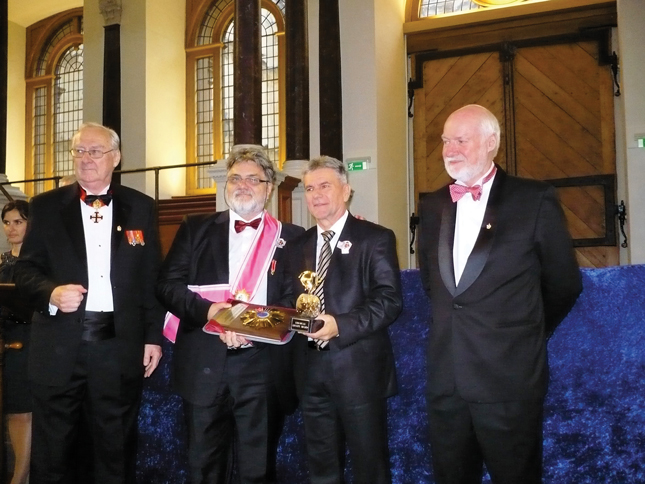
The organization “European Business Assembly” from Oxford has awarded Pan-European University “APEIRON” from Banja Luka with the European award for quality in education at the 48th promotion of awards “Socrates”, which is traditionally being awarded annually, during the Summit of leaders in Oxford. Darko Uremović, President of the Management Board, has received the award „United Europe“, which represents the most respected international reward for personal achievements in community development, as well as for personal contribution to the development of European integration. Pan-European University “APEIRON” has received this award for “… education system that has taken over the best examples of the educational processes of higher education institutions in Europe, and also as an appreciation for professionalism of the teaching staff, the quality of research work and the introduction and implementation of international standards and programs …”. The award consists of medal, statue and charter. At the ceremonial awarding, held on 20th June at the Oxford University, this award received LL.M. Siniša Aleksić, Director of the Pan-European University and Darko Uremović, project manager for the development and President of the Management Board. Medals and charters, together with statues that symbolize freedom and European unity, were presented to the Pan-European University representatives by Wil C. Goodheer, Prof. Dr., President of the international university from Vienna and the Club of Rectors of Europe, and John Netting, Director General, Europe Business Assembly and Professor at the Magna Carta College from Oxford.
The international standard of quality
The University introduced the international standard of quality management ISO 9001:2008 in higher education, adult education, scientific research and experimental development. The University is certified by the accreditation body TÜV Rheinland InterCert Kft. on 8th August 2011 under the number 75 100 50210. Policy of quality realization of the Pan-European University, in the field of higher education, represents a priority of the overall business policy of the institution, and has as its aim a continuous improvement, by meeting the requirements and needs of students, academic and business partners, employees and society as a whole as much as possible.
„WEBOMETRICS“ ranking list
On the influential world ranking list “Webometrics Ranking” (www.webometrics.info), created according to the extent of internet activities of universities and colleges, including more than 20 thousand higher education institutions, Pan-European University “APEIRON” Banja Luka is ranked among the best higher education institutions in Bosnia and Herzegovina and neighboring countries. Ranking list included all the information on higher education institutions published on the internet, the number of published teachers’ and students’ papers on the internet, students’ internet activities, dynamic of information displaying, etc. The aim of the ranking list is to evaluate to what extent universities and colleges are active participants in the information society of the 21st century.
Internal evaluations of the quality system
According to the Standards and Guidelines for quality assurance in the European higher education and Criteria for accreditation of higher education institutions in Bosnia and Herzegovina, the institution conducts continuous processes of self-evaluation and evaluation of the quality of its study programs, teaching processes and customer satisfaction measurement. In order to successfully meet this requirement, in accordance with the procedures for ensuring the quality of higher education institution and self-evaluation criteria, continuous surveys among students from different areas are being conducted. Therefore, at the Pan-European University, in the system of quality assurance, a set of surveys, conducted among students, has been established and the rules of processing and interpreting survey results have been defined:
- Evaluation of the study program and study organization (the goal of the survey is students’ evaluation of their study program as a whole, which contributes to a better planning of changes, curricula improvement and organization of studies in the study program, which, furthermore, contributes to the improvement of the program quality in general, and adaptation of the study programs to the students’ needs);
- Evaluation of courses and academic staff (evaluation of courses, that is, of separate program activities contributes to a better planning of changes in the curriculum of a separate course, and furthermore contributes to the improvement of the curricula, while the evaluation of the teaching staff, that was included in the course processing, contributes to an overall consideration of the work quality of the teaching staff, HR policy, and the improvement of human resources of the teaching staff);
- Assessment of services, institution and general conditions of studying (the goal of the survey is, apart from involving students into quality assessment, to gather information on the work of professional-administrative services and define measures for the improvement and upgrade of work); Students’ psychological profile;
- Motivational and marketing factors for choosing Pan-European University (the goal of the survey is to investigate motivations, views, needs and opinions of students when choosing to enroll at the Pan-European University);
Market positioning of graduates.
The main objective of the quality system is the assurance that the Pan-European University “APEIRON” ensures the provision of educational services, scientific research activities and non-teaching activities of high quality to its students and all interested parties, respectively. Quality Management System is designed in order to meet the requirements of international standards ISO 9001:2008, following Guidelines IWA:2 for the application of ISO 9001:2008 in education and the standards and guidelines for quality assurance in the European higher education ESG-ENQA.
The mission of Pan-European University “APEIRON” is based on an assumption that the societies of Southeast and East Europe are going through the process of changes, reforms, and transition towards a civil and democratic society, which is characterized by the parliamentary pluralism, legal system, the reign of law and market economy with the domination of private property. This new period of transition certainly needs new, deeper knowledge, which above all means a step forward from the present cultural and social environment of B&H/RS, towards a new view of the world and different approach to economics, legal system, health care, dissemination of information, and acquiring of knowledge. Within these tasks, Pan-European University “APEIRON” tends to overtake the role of an educator.
Pan-European University is able to achieve a high level of the educational and scientific process in accordance with the integration processes defined by the Bologna Declaration, and, by the quality of its services, to provide continued confidence and satisfaction of students, the economy, and society as a whole.
The education of students is based on the best experiences and traditions of American colleges and European universities with the application of all principles initiated by the Bologna reform process of the European higher education.
The quality policy of Pan-European University “APEIRON” is a priority of the overall business policy and aims to lasting progress, by meeting the demands and needs of all service users, business partners, employees, and society as a whole at the most.
The quality management system is focused on continuous improvement of the educational and scientific process, as well as the constant innovation of work processes. It is based on the requirements of ISO 9001:2008 and the guidelines IWA 2.
The management of Pan-European University “APEIRON” has a special responsibility for quality and its continuous improvement. Responsibility for quality assurance is the obligation of each employee within the work they perform.
The mission of Pan-European University “APEIRON” is to fully contribute to the improvement of the quality of life of the population, as well as to have a significant role in the economic development of the country by organizing academic studies for the young and lifelong learning programs.
The University will continuously work on the improvement of the quality of curricula, develop the highest standards of quality, and promote the highest standards of education and evaluation of acquired knowledge.
The quality policy is binding for all participants in the working processes of the University.
The Apeiron Pan-European University is an accredited higher education institution. The University was accredited by the Higher Education Accreditation Agency of the Republic of Srpska pursuant to the Report on the External on External Evaluation of the Quality System drawn up by the Accreditation Commission (No. 148-7/15, December 2015) based on the sample of five study programmes.
Out of nine criteria evaluated by the Agency: development and strategy of the higher education institution, governance, in-house quality assurance and quality culture, procedure and quality assurance of student programmes, human resources, quality of physical resources, presentation of information to the public and international cooperation, four criteria received a score “HEI predominantly fulfils the requirement”, and five criteria were scored “HEI fully meets the requirement”.
Such an outcome is the result of inspection of the crucial quality elements, the established method functioning of the Apeiron University and the analysis of all documents and procedures during the visit paid to the higher education institution.
The external evaluation was carried out by checking the fulfilment of requirements defined under the European Standards and Guidelines for the accreditation of higher education institutions with respect to study programmes of the Pan-European University.
The University applied for accreditation on 17 June 2015 and the Commission for quality assessment and audit and giving recommendations on the accreditation of higher education institutions was appointed by the Decision issued by the HEI Accreditation Agency of the Republic of Srpska on the Establishment of the National and International Experts for Quality Assessment and Audit and Giving Recommendations on the Accreditation of Higher Education Institutions, No. 175-2-1/15 dated 27 August 2015.
COLLEGE OF MARKET AND COMMUNICATION BELGRADE IN COOPEARTION WITH PAEUROPEAN UNIVERSITY APEIRON
Based on the Agreement on academic, scientific-technical and business cooperation, number 1728/10 from 11/8/2010, and the Decision on accreditation of joint study program, number 612-00-00930/2014-04 from 26/12/2014, Higher Vocational School for Market Communications performs accredited study programs in Belgrade and Banja Luka. Students from Banja Luka (the Republic of Srpska) can attend study programs of Higher Vocational School for Market Communications at the premises of Pan-European University.

“Support to students from Banja Luka, i.e. the Republic of Srpska, enrolled at Higher Vocational School for Market Communications, in terms of performing teaching activities in an extraordinary study and distance learning study, students will be able to realize at Pan-European University “APEIRON” Banja Luka in the form of:
- administrative and technical support (the admission can be done in Banja Luka, and the Student Services provides all required information, help, and services);
- professional and technical support (access to informational and educational resources of Higher Vocational School for Market Communications).
- teaching and testing activities for extraordinary students
NOTE: The student registers are kept in the headquarters of Higher Vocational School for Market Communications in Belgrade.”
- Work permit issued by the Ministry of Education, Science, and Technological Development of the Republic of Serbia, number 612-00-01134/2014-04 from 14/10/2014
- Decision on accreditation of the study program Propaganda and Public Relations, number 612-00-00657/2013-04 from 13/12/2013
- Decision on accreditation of the study program Translation Studies of the English Language, number 612-00-00516/2012-04 from 13/12/2013
- Decision on accreditation of the study program Advertising and Public Relations, number 612-00-239/2009-04 from 24/6/2011
- Decision on accreditation of the study program Internet Technologies and Electronic Business, number 612-00-00930/2014-04 from 26/12/2014
The educational program of this Higher vocational school creates a bridge between theory and practice and offers its students a chance to develop interdisciplinary and easily applicable skills for a range of possible professions within the market and communication industries, internet technologies, and electronic business.
The school has three three-year study programs of basic vocational studies: „Propaganda and Public Relations“, „Internet Technologies and Electronic Business“, and „Translation Studies of the English Language“, as well as a one-year program of specialist vocational studies: “Advertising and Public Relations”.
Information and registration
HIGHER VOCATIONAL SCHOOL FOR MARKET COMMUNICATIONS, address: Palmira Toljatija 5/I, 11070 Belgrade SRB, phone number: Tel: +381 11 267 32 93, +381 11 267 33 15; phone/fax number: +381 11 267 32 92; e-mail: info@stk.edu.rs; web site: www.stk.edu.rs PAN-EUROPEAN UNIVERSITY APEIRON, address: Bosnia and Herzegovina/the Republic of Srpska, Pere Krece 13, Pošt. fah 51, Banja Luka 78102; Student Services: phone number: +387 (0) 51 430 890; 430 892; 247 983; 247 984; fax number: 430 891; WEB mail: info@apeiron-edu.eu; Rector’s office: phone number: +387 (0) 51 247 920; fax number: 247 921; e-mail: rektorat@apeiron-edu.eu; University secretary: phone number: +387 (0) 51 247 944; www.apeiron-uni.eu
Study program of the basic vocational studies
PROPAGANDA AND PUBLIC RELATIONS
1. Vocational Manager – 180 ECTS-credits (in the field of Market Communications)
Study program of the specialist vocational studies
ADVERTISING AND PUBLIC RELATIONS
1. Vocational Manager Specialist- 60 ECTS-credits (in the field of Market Communications)
Scientific field - Social and humanistic sciences
Area – MANAGEMENT AND BUSINESS
The objective of this study program is education of specialized professionals in the field of propaganda and public relations, industrial advertising, recognizable branding, mass media communications, planning and implementation of media campaigns and related market activities, primarily in order to respond to the demands and interests of the economy and also of the public sector in this extremely important area of market and public communications. That interest is covered with expert and creative knowledge of propaganda, public relations, communication skills, internet and television advertising, corporate communications, graphic design, advertising and PR agencies, and agencies for market research and public opinion.
The basic vocational study program “Propaganda and Public Relations” is designed according to the latest current professional and scientific world standards in this field in order to create experts in the field of modern market and public communications, in which there are not enough well-educated professionals. This study program strives to educate and create vocational managers who will be able to apply in practice this valuable and specific knowledge.
Employment sectors
- Marketing and advertising agencies
- Broadcasting and production companies
- Public relations offices
- Marketing departments in companies
- Media and propaganda agencies
- Offices for corporate communication and image
- Translation and proofreading jobs in public and private sectors
- Information management jobs in English in technology, marketing, and consulting companies
- Translation agencies/departments in national and international organizations
- Managerial jobs in the field of professional translation, proofreading, and business communication in English
- Jobs related to communication in English in the field of high technology, economics, international trade and law at the national and international level
Banja Luka: Bosna i Hercegovina/RS, Pere Krece 13,, PO box 51 Banja Luka 78102;
www.apeiron-edu.eu
Student Service:
Phones: +387 (0) 51 430 890; 430 893; 430 892; 430 894; 247 983; 247 984; 247 940;
Fax: 430 891;
E-mail: info@apeiron-edu.eu;
Rector Office:
Phone: +387 (0) 51 247 920;
Fax; 247 921;
E-mail: rektorat@apeiron.edu.eu;
Council for Postgraduate and Doctoral Studies:
+387 (0) 51 247 977;
College of Modern Management:
+387 (0) 51 247 927; 247 974;
Law College:
+387 (0) 51 247 926; 247 973;
College of Information Technologies:
+387 (0) 51 247 925; 247 976;
College of Health Sciences:
+387 (0) 51 247 923; 247 976;
College of Sport Sciences:
+387 (0) 51 247 924; 247 975;
College of Philology:
+387 (0) 51 247 977;
College of Traffic Engineering:
+387 (0) 51 247 976;
Management
Steering Board: +387 (0) 51 247 942;
Director: +387 (0) 51 247 943;
Rector: +387 (0) 51 247 922;
E-mail: management@apeiron-edu.eu;
Library:
+387 (0) 51 247 941; 247 988;
Accounting:
+387 (0) 51 247 945;
Fax: +387 (0) 51 430 898;
E-mail: finansije@apeiron-edu.eu;
THE TYPE OF STUDIES
Studies of the first cycle (regular and extraordinary)
- in the period of 3 years / 6 semesters
- in the period of 4 years / 8 semesters
Studies of the second cycle
- master studies in the period of 1 year / 2 semesters (60 ECTS)
- master studies in the period of 2 years / 4 semesters (120 ECTS)
PhD studies* of the third cycle (3 years / 6 semesters)
- Lifelong Learning Program (outcome - vocational academy certifi cate)
- Programs of continuing professional education and training (outcome - vocational academy certifi cate). * In accordance with the obtained licenses.
EFFICIENCY/PASSING RATES/KNOWLEDGE STANDARDS

In order to achieve high motivation of students and high passing rates at the university with the European standard of acquired knowledge and skills, the university makes use of: block system of teaching, curricula and textbooks formatted according to the Bologna study metric, provided textbooks, recorded lectures and multimedia resources for learning, interactive activities in the classroom with small groups of students, organized educational workshops (seminars, case studies, legal clinics, simulations, VIP panels, student projects, instructional camps, collaborative learning). Planned passing rate at the university is 80%.
DIALOGUE SYSTEM OF EDUCATION BASED ON MENTOR SUPPORT
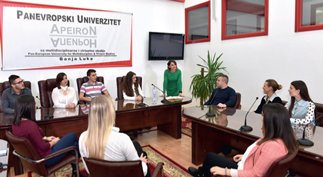
The educational concept is based on the European and American standards in the grading system, organization of studies, didactic methods and curricula. Practice at the University is based on the best experiences and traditions of American colleges and European universities with the application of all principles initiated by the Bologna reform process of the European higher education. At the University, only one-semester courses are held. Students are enabled to individualize their studies by choosing electives independently (there are up to 25% of them), which personalizes their studies within the multi-disciplinary study programs.
ENROLLMENT POLICY
- 1 st admission period: May/June
- 2 nd admission period: September
Application for admission is published in the leading daily newspapers in Bosnia and Herzegovina and the Republic of Srpska, as well as in other electronic news media. In the first year of study may enroll a person who has completed four years of secondary education in Bosnia and Herzegovina entities and Brčko District, or equivalent education abroad may. The University also enrolls foreign citizens. Students who already have a college or university degree or students who have graded their previously acquired education can continue their education in the third or fourth year of college within the study programs organized at Pan-European University »APEIRON«, if the study programs are equivalent, if the study programs are mutually abutting. The University does not organize entrance exam unless more candidates apply than planned. Information about the prescribed documentation and detailed enrollment requirements can be download.
THE GRADING SYSTEM
Public transparency and the accumulation of all forms of students’ activities are the characteristics of the grading system in which, the grade is formed on the basis of the evaluation of all sources of students’ activities (activities in the process of teaching, activities within the framework of independent educational forms and assessment of active exam knowledge). During the studies, in a system of vertical movement, other students’ achievements related to practice, work experience, published papers and participation in the projects are also graded, as well as previous formal and informal educational forms undergone by students.

